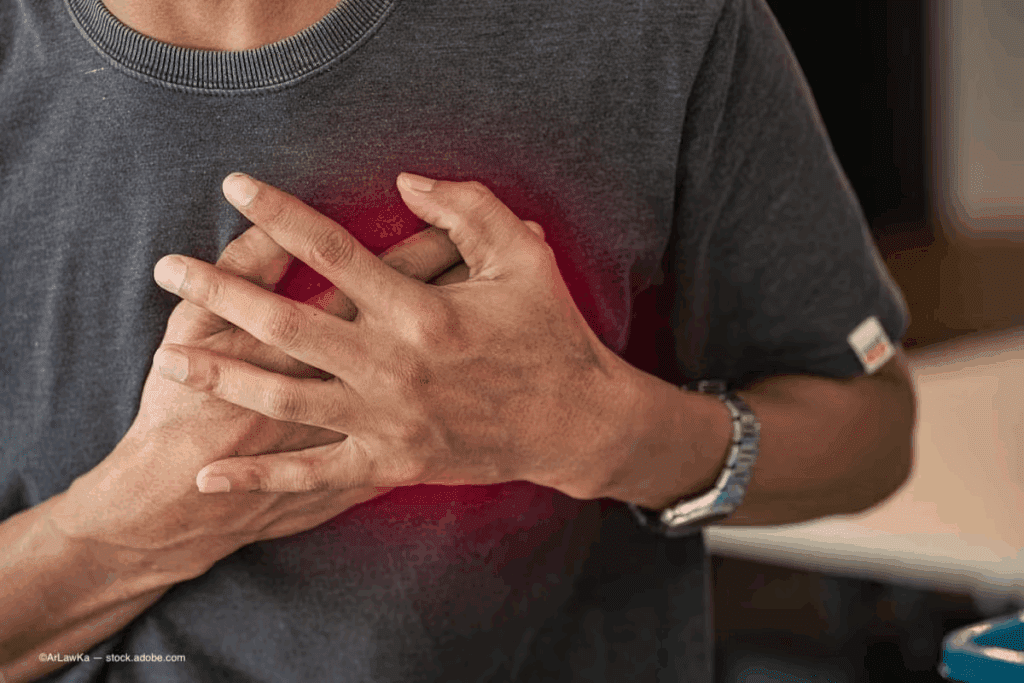Last Updated on November 25, 2025 by Ugurkan Demir

Are you feeling chest pain or pressure and thinking it might be from stress or anxiety? At Liv Hospital, we’re here to help you understand the connection between stress and chest pain.does stress cause chest painNuclear Cardiac Stress Test: Powerful Heart Health Evaluation We offer expert, patient-focused care you can rely on.
When we’re stressed, our body’s “fight or flight” response kicks in. This releases hormones like adrenaline and cortisol. These hormones can make our heart rate go up and our muscles tense, leading to chest pain.
In this article, we’ll dive into why stress causes chest pain, its symptoms, and how to manage it. We aim to help you find ways to ease your discomfort.

Stress and chest pain are linked through our body’s fight-or-flight response. This response is meant to protect us from danger. When we feel threatened, our brain sends a warning to our body.
This response gets our body ready to face or run from danger. It involves stress hormones, a faster heart rate, and blood flow to muscles.
Adrenaline and cortisol are key hormones in this response. Adrenaline is released quickly, causing our heart to beat faster. Cortisol is released later and stays high, causing long-term stress effects.
Adrenaline and cortisol make our heart rate and blood pressure go up. Our body needs more blood flow to muscles to fight or flee. This can cause chest pain in some people.
| Physiological Change | Effect on the Body |
| Increased Heart Rate | Rapid heartbeat, potentially leading to palpitations or chest discomfort |
| Elevated Blood Pressure | Increased strain on the heart, potentially causing chest pain or tightness |
| Hormonal Release | Adrenaline and cortisol surge, contributing to stress symptoms |
Understanding these changes shows how stress can cause chest pain. Knowing the signs of stress helps us manage it. This can reduce symptoms like chest discomfort.

It’s important to know about the different chest pain types caused by stress. Stress can show up in many ways, affecting the chest and overall health.
Feeling pressure or tightness in the chest is a common stress symptom. This feeling can be heavy or squeezing. Stress-induced chest pressure can be very intense, making it hard to breathe or relax.
Stress makes our body release hormones like adrenaline and cortisol. These hormones can make blood vessels narrow and heart rate go up. This can cause chest pressure, along with symptoms like a fast heartbeat and dizziness.
Chest tightness is another stress symptom. It feels like a band or vice around the chest, making deep breathing uncomfortable. The sensation of tightness can be constant or come and go, changing in intensity.
While stress can be uncomfortable, it’s usually not a sign of a serious heart problem. But, it’s important to tell the difference between stress-induced chest tightness and serious heart symptoms.
Stress chest pain can show up in different ways, like sharp or stabbing pain. It can also change with stress levels. Some people may feel chest pain that radiates to other areas, like arms, back, or shoulders.
Knowing these patterns can help people understand their symptoms better. It can also help them know when to seek medical help.
By understanding the different chest pain types caused by stress, people can start managing their symptoms. This can improve their overall well-being.
Stress can show up in many ways, including chest pain that looks like heart problems. It’s hard to tell if the pain is from stress or a heart issue. We’ll look at how stress can cause chest pain, the similarities and differences, and when to see a doctor.
Both stress and heart pain can be scary and disrupt your day. Stress pain is sharp and in one spot, while heart pain feels heavy and might spread. Both can hurt a lot and make you worried.
For example, people with anxiety chest pain for days might not know if it’s stress or a heart problem.
Stress pain is sharp and in one place, tied to breathing or movement. Heart pain is more spread out and might come with other signs like trouble breathing or feeling dizzy. Knowing these differences helps figure out what’s causing the pain.
People with constant heart pain from anxiety should know their pain might not be from their heart. But, it’s key to see a doctor to check for heart problems.
Knowing when to get emergency help is important. If your chest pain is bad, lasts a long time, or comes with other scary signs like trouble breathing, get help right away. Chest pain triggered by stress might be helped by relaxing and changing your lifestyle. But, it’s safer to get checked out for chest pain.
In short, stress can cause chest pain that looks like heart problems. Knowing the difference is key. If you’re not sure about your chest pain, always talk to a doctor.
Anxiety can make us feel physical pain, like a tightness in the chest. This feeling can be scary and make it hard to enjoy our day. It’s not just in our heads; it’s a real feeling that can hurt a lot.
When we’re anxious, our body can show it in many ways, like chest pain. This pain can come from breathing too fast, tense muscles, or our body’s stress response. Anxiety makes our heart beat faster and our blood pressure go up, which can hurt our chest.
Panic attacks are intense moments of fear that can happen fast. They can make us feel like we’re having a heart attack. The pain is sharp and can make our heart race, sweat, and shake.
Key symptoms of panic attack-related chest pain include:
Anxiety can cause chest pain that lasts for days. This pain can come from tight muscles and breathing too fast. When we’re anxious, we breathe shallowly, which can upset our blood’s balance and hurt our chest.
It’s important to tell the difference between anxiety pain and real health problems. If your chest pain doesn’t go away or is very bad, you should see a doctor. They can check if it’s something serious like a heart problem.
For some, anxiety can cause chest pain that never goes away. This pain can come from being stressed and tense all the time. To feel better, we need to deal with our anxiety through therapy and changing our lifestyle.
Strategies for managing constant chest pain from anxiety include:
Understanding how anxiety and chest pain are connected helps us manage these symptoms better. This can improve our overall health and happiness.
Stress can harm our heart over time. It affects our heart health in many ways. This includes both physical and mental factors.
Long-term stress raises the risk of heart disease. It can cause high blood pressure, heart palpitations, and cardiac arrhythmias. This strain can damage the heart, leading to serious conditions like coronary artery disease or heart failure.
Stress can make us feel physical symptoms, like tightness in the chest. Long-term anxiety can cause chronic chest pain. It’s key to understand how our mind and body are connected when it comes to stress and heart health.
Some common symptoms of long-term stress include:
Yes, long-term stress can cause chest tightness. Stress triggers our “fight-or-flight” response, releasing hormones like adrenaline and cortisol. These hormones can make our heart beat faster and our blood vessels narrower, leading to chest tightness.
It’s important to manage stress to protect our heart health. Using mindfulness, deep breathing exercises, and regular physical activity can help reduce stress. This promotes better heart health.
Figuring out if chest pain is from stress is tricky. Doctors first check if it’s a heart problem or stress. They need to know if the pain is serious or just from stress.
To find out if chest pain is stress-related, we start with tests for heart problems. These might include:
These tests help us figure out if the pain is from the heart or if we need to look at the mind.
| Test | Purpose |
| Electrocardiogram (ECG) | Checks heart rhythm and finds problems |
| Stress Test | Sees how the heart works when stressed |
| Blood Tests | Looks for heart damage signs |
| Echocardiogram | Studies heart structure and function |
If heart tests show nothing wrong, we look at the mind. We use:
Telling physical pain from stress pain is important. We look at the pain’s type, what triggers it, and the patient’s history. By mixing medical and mental health findings, we can tell if stress is the main cause.
Getting the right diagnosis is key to helping patients with stress-related chest pain.
When stress causes chest pain, finding quick relief is key. It helps both your body and mind feel better. Stress chest pain can be scary, so it’s important to know how to handle it.
There are many ways to ease stress chest pain. These methods help relax your muscles, calm your mind, and reduce tension.
Breathing techniques are great for easing chest pain from stress. Deep breathing exercises slow your heart, lower blood pressure, and relax you. To do deep breathing, breathe in slowly through your nose, hold it, and then breathe out slowly through your mouth. Do this a few times, focusing on your breath.
Diaphragmatic breathing, or belly breathing, is also helpful. It means breathing deeply into your belly, not your chest. Put one hand on your belly and the other on your chest. As you breathe in, your belly should go up while your chest stays the same. This can help reduce stress and ease chest pain.
Progressive muscle relaxation involves tensing and relaxing different muscles. It helps reduce tension and relaxes you. Start by tensing your toes, holding for a few seconds, and then relaxing. Move up to your chest, shoulders, and head, tensing and relaxing each area.
This method is great for stress chest pain. It helps you focus on your body’s sensations and release tension. Relaxing your muscles can ease chest pain and help you relax.
Mindfulness practices are very effective for managing sudden stress chest pain. Mindfulness is about being present without judgment. When you have chest pain, focus on your breath, feeling the air move in and out.
Mindfulness meditation is also helpful. Sit comfortably, close your eyes, and focus on your breath or a mantra. If your mind wanders, gently bring it back to your focus. Regular mindfulness can lower stress and anxiety, making it easier to handle chest pain.
By using these techniques regularly, you can better manage stress chest pain and improve your well-being.
Preventing stress-related chest pain requires big lifestyle changes, mental health strategies, and sometimes medical help. A detailed plan is key for those with stress-induced chest pain.
Healthy lifestyle changes are vital for long-term management. Regular exercise lowers stress and anxiety by releasing happy hormones. Try walking, jogging, or yoga daily.
Eating well is also key. A balanced diet with fruits, veggies, whole grains, and lean proteins boosts well-being. Avoid foods high in sugar, caffeine, and sodium.
Psychological methods are essential for managing stress-related chest pain. Cognitive-behavioral therapy (CBT) helps change negative thoughts that cause stress. It’s effective in reducing anxiety and chest pain.
Mindfulness practices like meditation and deep breathing are also helpful. They help you stay aware of your thoughts and feelings, managing stress better.
Sometimes, medical help is needed for stress-related chest pain. Medications like beta blockers or anti-anxiety drugs may be prescribed. Always use them as directed by a doctor.
It’s also important to treat any underlying health issues that may cause stress and chest pain. Work closely with a healthcare provider to create a full treatment plan.
We’ve looked into how stress and chest pain are connected. We’ve seen how stress can cause chest pain and why it’s important to understand this. Knowing this helps us manage it better.
To fix chest pain from stress, we need to tackle the stress itself. We can do this by making healthy lifestyle choices. This means finding quick fixes, long-term solutions, and sometimes, seeing a doctor.
Handling stress chest pain well means using many methods. These include breathing exercises, muscle relaxation, and being mindful. These steps help lessen how often and how bad the chest pain gets.
Our aim is to give people the tools to handle stress and chest pain. This way, they can live better lives. We believe the right steps can reduce stress’s harm to our hearts and health. This leads to a better life, focusing on health and happiness.
Yes, stress can lead to chest pain. This happens because of how our body reacts to stress. It includes the fight-or-flight response and hormonal changes that affect our heart rate and blood pressure.
Stress can cause different types of chest pain. These include feeling pressure, tightness, or sharp pains. These symptoms are often linked to stress and anxiety.
Stress-induced chest pain usually comes with other symptoms like anxiety and rapid heartbeat. On the other hand, cardiac chest pain feels like a squeezing or pressure in the chest. It might also spread to the arm, neck, or jaw.
Yes, anxiety can lead to persistent chest discomfort. This includes pain that lasts for days. It happens because of the body’s stress response staying active for a long time.
Chronic stress can harm your heart health. It can increase the risk of high blood pressure, heart disease, and cardiac arrhythmias.
To diagnose stress-related chest pain, doctors first rule out heart conditions with tests. Then, they assess your stress and anxiety levels.
To quickly ease stress chest pain, try breathing techniques, progressive muscle relaxation, and mindfulness. These can help reduce symptoms and stress.
To prevent stress chest pain long-term, make lifestyle changes. This includes regular exercise and a balanced diet. Also, consider psychological approaches like cognitive-behavioral therapy and medical interventions when needed.
Yes, long-term stress can cause chest tightness. This is because of the body’s stress response staying active. It can lead to muscle tension and strain on the heart.
Seek medical help right away if you have severe chest pain or trouble breathing. These could be signs of a heart condition or another serious issue.
Subscribe to our e-newsletter to stay informed about the latest innovations in the world of health and exclusive offers!